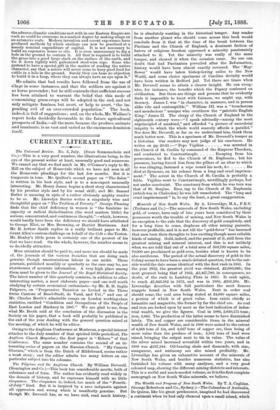The Pilgrims and the Anglican Church. By William Deverell. (Remington
and Co.)—This book has considerable merits, both of substance and of form. The author has evidently read widely in the domain of history, and he expresses himself with no little eloquence. The eloquence is, indeed, too much of the " Fourth- of-July " kind. But it is inspired by a seen indignatio against all oppression and wrong which is manifestly genuine. But though Mr. Deverell has, as we have said, read much history, he is absolutely wanting in the historical temper. Any reader from another planet who should come across this book would conclude from it that at the time of the break between the Puritans and the Church of England, a dominant faction -of haters of religious freedom oppressed a minority passionately attached to it. Yet the minority was really of the same temper, and showed it when the occasion came. No one can doubt that had Puritanism prevailed after the Reformation, history would have been almost exactly reversed. The May- flower' would have taken bishop-loving exiles to the New World, and some choice specimens of Caroline divinity would have been written in Bedford jail. Yet there are times when Mr. Deverell seems to attain a clearer insight. He can recog- nise, for instance, the benefits which the Papacy conferred on civilisation. But there are things and persons that he evidently finds it impossible to treat with fairness, we might say, with decency. James I. was " in character, in manners, and in person. alike vile and contemptible." William III. was a "treacherous and mendacious" usurper who overthrew the "patriotic English King," James II. The clergy of the Church of England in the
• eighteenth century were—" I speak advisedly—among the most unprincipled of mankind," and afforded " a picture of sacerdotal iniquity to which the whole world scarcely affords a parallel." Nor does Mr. Deverell, as far as we understand him, think them much better now. This is a specimen of Mr. Deverell's temper as a historian. Our readers may now judge of his exactness. He writes on pp. 20-21 :—" Pope Vigilius was arrested in the Church of St. Cecilia by command of the Empress Theodora, and conducted to Constantinople Escaping from his persecutors, he fled to the Church of St Euphemia ; but his pursuers, having forced him from the pillars of- an altar to which
he was clinging, fastened a rope round his neck, dre He died at Syracuse, on his release from a long and cruel imprison- ment." The arrest in the Church of St. CEecilia is probably a fable. Vigilins went to Constantinople, unwillingly perhaps, but not under constraint. The sanctuary from which he was torn was that of St. Sergius. Ewa: ing to the Church of St. Euphemia (which was in Chalcedon) he was left unmolested. The "long and cruel imprisonment " is, to say the least, a great exaggeration.


































 Previous page
Previous page